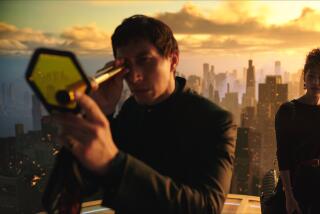MOVIE REVIEW : ‘Cain’: De Palma’s Return to His Bloodthirsty Roots
- Share via
“De Mented, De Ranged, De Ceptive, De Palma” read the clever billboards for “Raising Cain,” but like the picture in question, they don’t go far enough. More to the point would be De Rivative, De Linquent and De Pressing.
Depressing because writer-director Brian De Palma is one of the most talented of American filmmakers, albeit someone who has fallen on creative hard times. Of his most recent films, “Casualties of War” was a serious, provocative film that couldn’t buy an audience, and “Bonfire of the Vanities” couldn’t have managed more negative publicity if it had been directed by Dan Quayle.
De Palma made his reputation with bravura, disturbing psychological thrillers on the order of “Obsession,” “Dressed to Kill” and “Carrie,” and in “Raising Cain” (citywide) he seems to be returning to these bloodthirsty roots. But “Raising Cain” aspires to be more than a conventional thriller, and in this ambition lies its undoing.
The first image on screen is Dr. Carter Nix (John Lithgow) cooing to his baby daughter Amy. It is a video image because instead of an intercom system between the master bedroom and Amy’s room, Carter has installed a video hookup. Talk about being a concerned dad.
But wait, there’s more. Son of an inexplicably Norwegian authority on childhood development, Carter himself is a child psychologist who is taking serious time off from his practice to try out his theories on his own flesh and blood. So while his cancer-doctor wife, Jenny (Lolita Davidovich), toils in the local hospital in the hamlet of Bay View, Carter ferries little Amy to the park, says “darn” when things go wrong, and in general seems far too good to be true.
Which, of course, he is, for there is a dark side to Carter Nix, symbolized by twin Cain Nix (also played by Lithgow), a sneering, sunglass-wearing lout who always seems to show up when things go bad. The interaction between these two and their growing obsession with growing children is as close to a focus as “Raising Cain” can manage.
Even if it were ethical to completely synopsize this film, it might not be possible to do so coherently, because De Palma has concocted a hugely improbable stew that is preposterous from beginning to end. And, despite some early confusion on this point, he has clearly done so with careful deliberation, intending “Raising Cain” to function simultaneously as both a thriller and a parody of thrillers.
A commendably ambitious idea, but one that does not work well at all in this particular case. First off that script, a reworking of Michael Powell’s brilliantly twisted thriller “Peeping Tom,” with elements of Alfred Hitchcock’s “Psycho” and De Palma’s own “Sisters” thrown in, is finally too arbitrary to be involving even as a parody.
This obviously hurts the actors, who are either, like Davidovich and Steven Bauer (who plays an old beau who reappears on the scene), trapped by some very flat lines and hoary situations or, like Lithgow, consciously over the top in a role that is more showy than satisfying.
De Palma clearly did not want to do a conventional thriller, and so his considerable prowess in that area is only occasionally brought to bear. As a result, despite a few finely creepy moments that remind us of his talent, the shocking parts of “Raising Cain” (rated R for sexuality, language and terror violence) feel lethargic and lacking in purpose.
That same lack of energy also carries over to the parody elements, for without zest and palpable enthusiasm, a sendup is fated to be dispiriting and largely humorless. Trying to have it both ways, “Raising Cain” ends up succeeding on neither end.
‘Raising Cain’
John Lithgow: Carter/Cain
Lolita Davidovich: Jenny
Steven Bauer: Jack
Frances Sternhagen: Dr. Waldheim
A Pacific Western production, released by Universal Pictures. Director Brian De Palma. Producer Gale Anne Hurd. Screenplay Brian De Palma. Cinematographer Stephen H. Burum. Editors Paul Hirsch, Bonnie Koehler, Robert Dalva. Costumes Bobbie Read. Music Pino Donaggio. Production design Doug Kraner. Art director Mark Billerman. Set decorator Barbara Munch. Running time: 1 hour, 36 minutes.
MPAA-rated R (sexuality, language and terror violence).
More to Read
Only good movies
Get the Indie Focus newsletter, Mark Olsen's weekly guide to the world of cinema.
You may occasionally receive promotional content from the Los Angeles Times.











